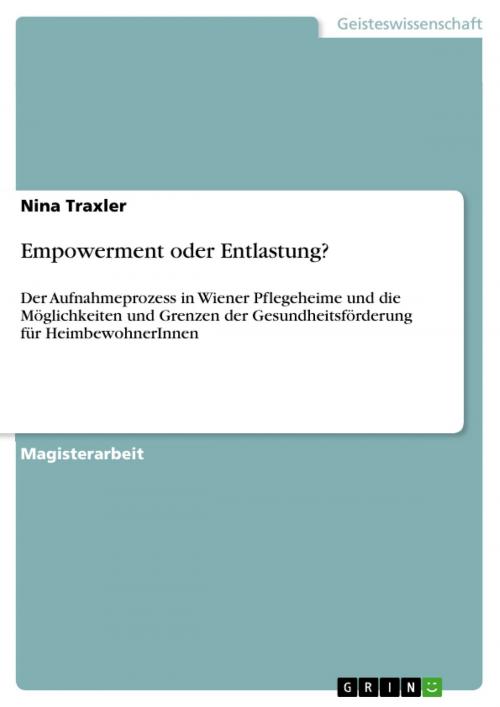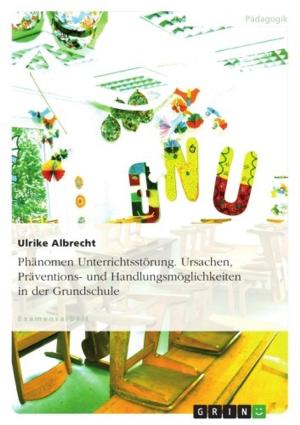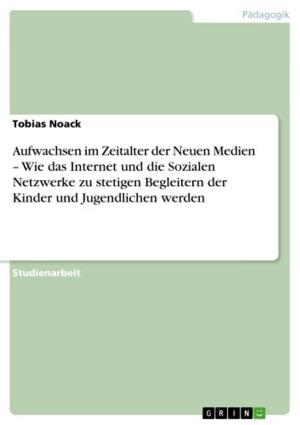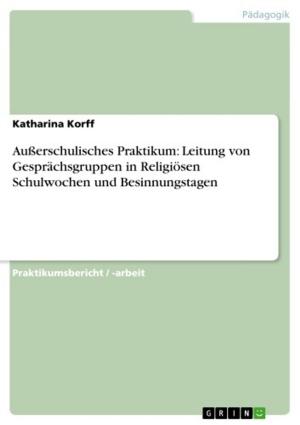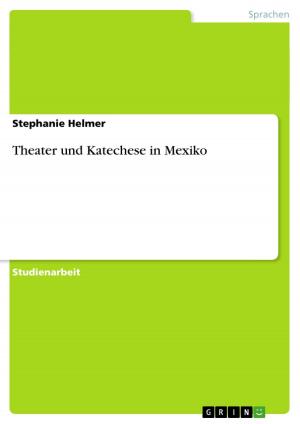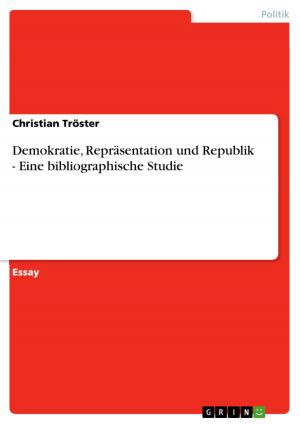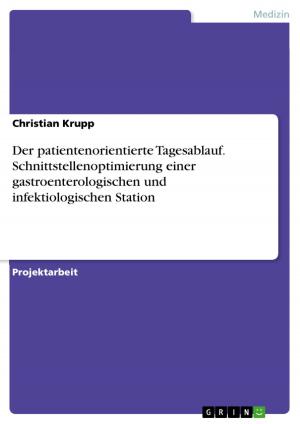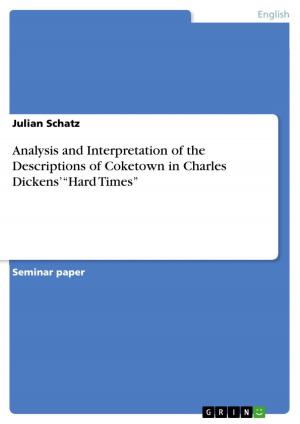Empowerment oder Entlastung?
Der Aufnahmeprozess in Wiener Pflegeheime und die Möglichkeiten und Grenzen der Gesundheitsförderung für HeimbewohnerInnen
Nonfiction, Social & Cultural Studies, Social Science, Gerontology| Author: | Nina Traxler | ISBN: | 9783638800082 |
| Publisher: | GRIN Verlag | Publication: | July 24, 2007 |
| Imprint: | GRIN Verlag | Language: | German |
| Author: | Nina Traxler |
| ISBN: | 9783638800082 |
| Publisher: | GRIN Verlag |
| Publication: | July 24, 2007 |
| Imprint: | GRIN Verlag |
| Language: | German |
Magisterarbeit aus dem Jahr 2005 im Fachbereich Soziologie - Alter, Note: 1,0, Universität Wien (Institut für Soziologie), 179 Quellen im Literaturverzeichnis, Sprache: Deutsch, Abstract: Nursing homes still suffer from a deeply rooted, bad image because of their structural problems, like the lack of privacy and qualified staff. This research project concentrates on the entry into long-term geriatric care. Becoming a resident of a nursing home has a big effect on the quality of life: the frail elderly person has to adapt to certain rules, norms, a new daily routine, room neighbors etc. Therefore this entry is in most cases a negative life event that leads not only to a psychological crisis but can also affect health negatively. This research project was based on the assumption that the organization of the entry can influence the elderly's ability to cope with the demanding situation. The aim of this project was to describe this admission process and the structures that determine it, and to answer the following questions: How is the entry organized? How can the role of the elderly in this process be described? How can the organization support new residents and promote their health? The chosen qualitative research approach made possible a complex and profound description of the social phenomena of the 'admission process'. The main result was that the organizational process differs within the three types only regarding flexibility and time structure. Although each organization has a different view of itself, in all three of them a characteristic of the admission process is a focus mainly on functional and organizational needs. Family members not only play the main role as informers but receive more social support than the new home resident. The help dedicated to the new residents is rather instrumental because of the belief that only time can help them to cope with the crisis. The elderly are regarded as frail. Due to the perceived need to protect them their active involvement in the admission process is minimized. It seems as if the former human being is often reduced to a passive patient or customer that loses control not only over his body, but also his mind and soul. A health promoting arrangement of the entry into long-term care should in short consider the following aspects: participation, reduction of hierarchy, case management and a greater number of sufficiently qualified nursing staff. In general, the involvement of residents in decision-making processes seems to be by far the most important health-promoting factor.
Magisterarbeit aus dem Jahr 2005 im Fachbereich Soziologie - Alter, Note: 1,0, Universität Wien (Institut für Soziologie), 179 Quellen im Literaturverzeichnis, Sprache: Deutsch, Abstract: Nursing homes still suffer from a deeply rooted, bad image because of their structural problems, like the lack of privacy and qualified staff. This research project concentrates on the entry into long-term geriatric care. Becoming a resident of a nursing home has a big effect on the quality of life: the frail elderly person has to adapt to certain rules, norms, a new daily routine, room neighbors etc. Therefore this entry is in most cases a negative life event that leads not only to a psychological crisis but can also affect health negatively. This research project was based on the assumption that the organization of the entry can influence the elderly's ability to cope with the demanding situation. The aim of this project was to describe this admission process and the structures that determine it, and to answer the following questions: How is the entry organized? How can the role of the elderly in this process be described? How can the organization support new residents and promote their health? The chosen qualitative research approach made possible a complex and profound description of the social phenomena of the 'admission process'. The main result was that the organizational process differs within the three types only regarding flexibility and time structure. Although each organization has a different view of itself, in all three of them a characteristic of the admission process is a focus mainly on functional and organizational needs. Family members not only play the main role as informers but receive more social support than the new home resident. The help dedicated to the new residents is rather instrumental because of the belief that only time can help them to cope with the crisis. The elderly are regarded as frail. Due to the perceived need to protect them their active involvement in the admission process is minimized. It seems as if the former human being is often reduced to a passive patient or customer that loses control not only over his body, but also his mind and soul. A health promoting arrangement of the entry into long-term care should in short consider the following aspects: participation, reduction of hierarchy, case management and a greater number of sufficiently qualified nursing staff. In general, the involvement of residents in decision-making processes seems to be by far the most important health-promoting factor.
